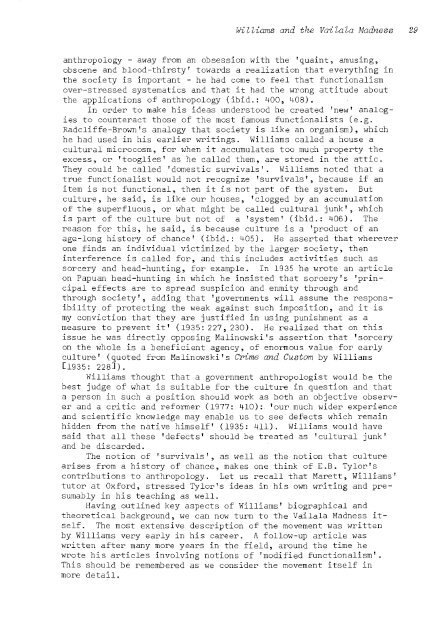CONTENTS NO.I - Institute of Social and Cultural Anthropology ...
CONTENTS NO.I - Institute of Social and Cultural Anthropology ...
CONTENTS NO.I - Institute of Social and Cultural Anthropology ...
You also want an ePaper? Increase the reach of your titles
YUMPU automatically turns print PDFs into web optimized ePapers that Google loves.
WiLLiams <strong>and</strong> the VaiLaLa Madness 29<br />
anthropology - away from an obsession with the 'quaint, ,<br />
obscene <strong>and</strong><br />
, towards a realization that everything in<br />
the society is important - he had come to feel that functionalism<br />
over-stressed<br />
the<br />
<strong>and</strong> that it had the wrong attitude about<br />
<strong>of</strong> anthropology (ibid.: 400,408).<br />
In order to make his ideas understood he created 'new' analogies<br />
to counteract those <strong>of</strong> the most famous functionalists (e.g.<br />
Radcliffe-Brown's analogy that society is like an organism), which<br />
he had used in his earlier<br />
Williams called a house a<br />
cultural microcosm, for when it accumulates too much property the<br />
excess, or 'tooglies' as he called them, are stored in the attic.<br />
could be called 'domestic survivals'. Williams noted that a<br />
true functionalist would not 'survivals', because if an<br />
item is not functional, then it is not part <strong>of</strong> the system. But<br />
culture, he said, is like our houses, , by an accumulation<br />
<strong>of</strong> the , or what be called cultural junk', which<br />
is part <strong>of</strong> the culture but not <strong>of</strong> a 'system' (ibid.: 406). The<br />
reason for this, he is because culture is a <strong>of</strong> an<br />
age-long history <strong>of</strong> chance' (ibid.: 405). He asserted that wherever<br />
one finds an individual victimized the larger society, then<br />
interference is called for, <strong>and</strong> this includes activities such as<br />
sorcery <strong>and</strong> head-hunting, for example. In 1935 he wrote an article<br />
on Papuan<br />
in which he insisted that sorcery's<br />
effects are to suspicion <strong>and</strong> enmity through <strong>and</strong><br />
through<br />
that 'governments will assume the respons<strong>of</strong><br />
protecting the weak such imposition, <strong>and</strong> it is<br />
my conviction that they are justified in using punishment as a<br />
measure to prevent it' (1935: 227,230). He realized that on this<br />
issue he was directly opposing Malinowski's assertion that 'sorcery<br />
on the whole is a beneficient agency, <strong>of</strong> enormous value for early<br />
culture' (quoted from Malinowski's Crime <strong>and</strong> Custom by Williams<br />
[1935: 228]).<br />
Williams thought that a government anthropologist would be the<br />
best judge <strong>of</strong> what is suitable for the culture in question <strong>and</strong> that<br />
a person in such a position should work as both an objective observer<br />
<strong>and</strong> a critic <strong>and</strong> reformer (1977: 410): 'our much wider experience<br />
<strong>and</strong> scientific<br />
may enable us to see defects which remain<br />
hidden from the native himself' (1935: 411). Williams would have<br />
said that all these 'defects' should be treated as 'cultural junk'<br />
<strong>and</strong> be discarded.<br />
The notion <strong>of</strong> 'survivals', as well as the notion that culture<br />
arises from a history <strong>of</strong> chance, makes one think <strong>of</strong> E.B. Tylor's<br />
contributions to anthropology. Let us recall that Marett, Williams'<br />
tutor at Oxford, stressed Tylor's ideas in his own writing <strong>and</strong> presumably<br />
in his teaching as well.<br />
Having outlined key aspects <strong>of</strong> Williams'<br />
<strong>and</strong><br />
theoretical background, we can now tUrn to the Vailala Madness itself.<br />
The most extensive<br />
<strong>of</strong> the movement was written<br />
by Williams very early in his career. A follow-up article was<br />
written after many more years in the around the time he<br />
wrote his articles involving notions <strong>of</strong> 'modified functionalism' .<br />
This should be remembered as we consider the movement itself in<br />
more detail.

















